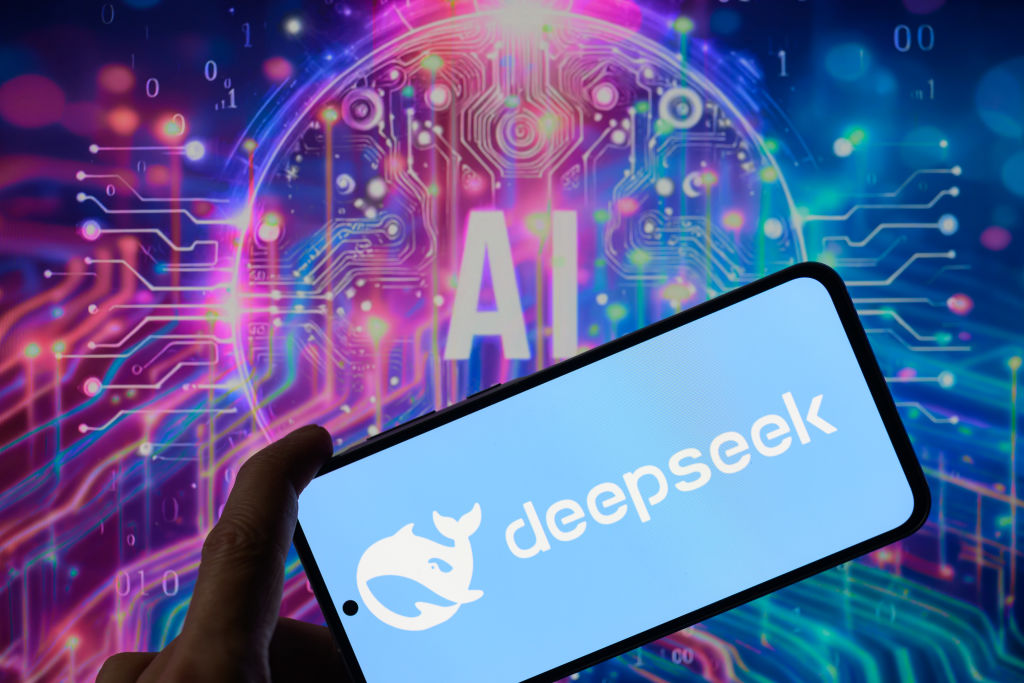The Explosion of New AI Tools
Workers and consumers soon won’t be able to escape generative AI. Does that mean societal disruption and productivity gains are right around the corner?


Profit and prosper with the best of Kiplinger's advice on investing, taxes, retirement, personal finance and much more. Delivered daily. Enter your email in the box and click Sign Me Up.
You are now subscribed
Your newsletter sign-up was successful
Want to add more newsletters?

Delivered daily
Kiplinger Today
Profit and prosper with the best of Kiplinger's advice on investing, taxes, retirement, personal finance and much more delivered daily. Smart money moves start here.

Sent five days a week
Kiplinger A Step Ahead
Get practical help to make better financial decisions in your everyday life, from spending to savings on top deals.

Delivered daily
Kiplinger Closing Bell
Get today's biggest financial and investing headlines delivered to your inbox every day the U.S. stock market is open.

Sent twice a week
Kiplinger Adviser Intel
Financial pros across the country share best practices and fresh tactics to preserve and grow your wealth.

Delivered weekly
Kiplinger Tax Tips
Trim your federal and state tax bills with practical tax-planning and tax-cutting strategies.

Sent twice a week
Kiplinger Retirement Tips
Your twice-a-week guide to planning and enjoying a financially secure and richly rewarding retirement

Sent bimonthly.
Kiplinger Adviser Angle
Insights for advisers, wealth managers and other financial professionals.

Sent twice a week
Kiplinger Investing Weekly
Your twice-a-week roundup of promising stocks, funds, companies and industries you should consider, ones you should avoid, and why.

Sent weekly for six weeks
Kiplinger Invest for Retirement
Your step-by-step six-part series on how to invest for retirement, from devising a successful strategy to exactly which investments to choose.
To help you understand the trends surrounding AI and other new technologies and what we expect to happen in the future, our highly experienced Kiplinger Letter team will keep you abreast of the latest developments and forecasts. (Get a free issue of The Kiplinger Letter or subscribe). You'll get all the latest news first by subscribing, but we will publish many (but not all) of the forecasts a few days afterward online. Here’s the latest…
AI is on the cusp of going mainstream. By next year, more money will be spent globally on software with generative AI than on software without it, according to Gartner, a technology market research company.
This year, nearly every major software company will have a generative AI feature in all their products, or will have plans to roll them out this year or next, noted John Lovelock, an analyst at Gartner, in a recent presentation.
From just $107.88 $24.99 for Kiplinger Personal Finance
Become a smarter, better informed investor. Subscribe from just $107.88 $24.99, plus get up to 4 Special Issues

Sign up for Kiplinger’s Free Newsletters
Profit and prosper with the best of expert advice on investing, taxes, retirement, personal finance and more - straight to your e-mail.
Profit and prosper with the best of expert advice - straight to your e-mail.
Spending on generative AI software in 2026 will be nearly $400 billion globally, compared with $282 billion on traditional software, predicts Gartner. By 2028, those figures will be $700 billion and $188 billion. AI-heavy software landed $18 billion in 2023, the first full year the technology was available to the masses. OpenAI’s ChatGPT, a text-generating AI chatbot, was released to the public in November 2022.
The trend is rapidly putting powerful AI features in the hands of millions of people. For example, Adobe Photoshop’s Generative Fill lets users select a portion of an image to add anything, such as the perfect water drop on a flower. Microsoft’s CoPilot lets users create slideshows by picking a template, providing a text outline and letting AI do the rest. Want to tweak a slide? Simply write a suggestion to Microsoft’s AI chatbot. AI is also becoming prevalent in software for analytics, customer relationship tools and supply chain systems.
The deployment of AI brings both opportunity and risk for businesses. The companies that are fastest to harness productive uses will have an edge, including workers who figure out how to use AI creation tools to produce text, images, charts, computer code and more, or to better analyze data, images or written research.
But businesses rushing to use AI without a plan could lead to damaging missteps, ranging from wasted hours to security threats. Plenty of AI tools won’t be fully baked and won’t help productivity much at first. Companies need a clear plan and set of guidelines for generative AI before taking the plunge.
Meanwhile, consumers are seeing AI seamlessly make its way into popular apps and websites, whether they want it or not. Facebook and Instagram users can tap Meta’s AI chatbots to answer questions or generate images. Alphabet’s CEO Sundar Pichai recently said that Google’s AI Overviews, its new AI search tool that provides detailed explanations to Google search queries, “are one of our most popular Search features ever.”
Rapid adoption of generative AI holds a lot of promise for the economy, along with peril for businesses that face disruption and workers who fear displacement. However, that doesn’t mean the fallout will happen overnight. Even with AI getting rolled out at an unprecedented pace, expect the widescale impact to take place over years or even decades. The AI age is just getting started.
Related Content
- Can Stocks Picked by Artificial Intelligence Beat the Market?
- Best AI Stocks to Buy
- Tech Heavy Hitters Join Forces to Form AI Alliance
Profit and prosper with the best of Kiplinger's advice on investing, taxes, retirement, personal finance and much more. Delivered daily. Enter your email in the box and click Sign Me Up.

John Miley is a Senior Associate Editor at The Kiplinger Letter. He mainly covers AI, technology, telecom and education, but will jump on other business topics as needed. In his role, he provides timely forecasts about emerging technologies, business trends and government regulations. He also edits stories for the weekly publication and has written and edited email newsletters.
He holds a BA from Bates College and a master’s degree in magazine journalism from Northwestern University, where he specialized in business reporting. An avid runner and a former decathlete, he has written about fitness and competed in triathlons.
-
 Quiz: Do You Know How to Avoid the "Medigap Trap?"
Quiz: Do You Know How to Avoid the "Medigap Trap?"Quiz Test your basic knowledge of the "Medigap Trap" in our quick quiz.
-
 5 Top Tax-Efficient Mutual Funds for Smarter Investing
5 Top Tax-Efficient Mutual Funds for Smarter InvestingMutual funds are many things, but "tax-friendly" usually isn't one of them. These are the exceptions.
-
 AI Sparks Existential Crisis for Software Stocks
AI Sparks Existential Crisis for Software StocksThe Kiplinger Letter Fears that SaaS subscription software could be rendered obsolete by artificial intelligence make investors jittery.
-
 AI Sparks Existential Crisis for Software Stocks
AI Sparks Existential Crisis for Software StocksThe Kiplinger Letter Fears that SaaS subscription software could be rendered obsolete by artificial intelligence make investors jittery.
-
 A Scary Emerging AI Threat
A Scary Emerging AI ThreatThe Kiplinger Letter An emerging public health issue caused by artificial intelligence poses a new national security threat. Expect AI-induced psychosis to gain far more attention.
-
 An Inflection Point for the Entertainment Industry
An Inflection Point for the Entertainment IndustryThe Kiplinger Letter The entertainment industry is shifting as movie and TV companies face fierce competition, fight for attention and cope with artificial intelligence.
-
 I Met With 100-Plus Advisers to Develop This Road Map for Adopting AI
I Met With 100-Plus Advisers to Develop This Road Map for Adopting AIFor financial advisers eager to embrace AI but unsure where to start, this road map will help you integrate the right tools and safeguards into your work.
-
 Humanoid Robots Are About to be Put to the Test
Humanoid Robots Are About to be Put to the TestThe Kiplinger Letter Robot makers are in a full-on sprint to take over factories, warehouses and homes, but lofty visions of rapid adoption are outpacing the technology’s reality.
-
 Trump Reshapes Foreign Policy
Trump Reshapes Foreign PolicyThe Kiplinger Letter The President starts the new year by putting allies and adversaries on notice.
-
 Congress Set for Busy Winter
Congress Set for Busy WinterThe Kiplinger Letter The Letter editors review the bills Congress will decide on this year. The government funding bill is paramount, but other issues vie for lawmakers’ attention.
-
 Billed 12 Hours for a Few Seconds of Work: How AI Is Helping Law Firms Overcharge Clients
Billed 12 Hours for a Few Seconds of Work: How AI Is Helping Law Firms Overcharge ClientsThe ability of AI to reduce the time required for certain legal tasks is exposing the legal profession's reliance on the billable hour.